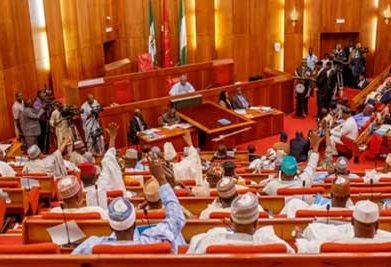Insecurity, terrorism in Nigeria not religion-driven — Senate

…To Hold Executive Session on U.S. ‘Religious Persecution’ Debate
..Withdraws Motion on Alleged Christian Genocide Narrative
By Henry Umoru
ABUJA — The Senate has clarified that the insecurity and terrorism confronting Nigeria are not driven by religion, but by geography, circumstance, and socio-economic factors.
This position emerged on Thursday during deliberations on a motion titled, “Urgent Need to Correct Misconceptions Regarding the Purported ‘Christian Genocide’ Narrative in Nigeria and in the International Community.”
The motion, sponsored by Senator Ali Ndume (APC, Borno South) and co-sponsored by 20 others, sought to engage the U.S. Congress and international organizations to correct what lawmakers described as a growing misrepresentation of Nigeria’s security situation.
After extensive debate, the Senate resolved to hold an executive session to further deliberate on the sensitive issue and stepped down the motion to the next legislative day.
Senate President Godswill Akpabio emphasized that terrorism in Nigeria affects all regions and religious groups indiscriminately.
“If terrorism occurs in a Christian-dominated area, Christians will be the victims; if it happens in a Muslim-dominated area, Muslims will be the victims,” Akpabio said.
He cautioned that misinformation abroad could lead to damaging international sanctions, worsening poverty and insecurity across the country. “We should have a small team to visit our colleagues in the U.S., because some people must have gone there to give a one-sided story,” he added.
Senate Leader Opeyemi Bamidele (APC, Ekiti Central) also affirmed the chamber’s position, saying: “It is our conviction that the insecurity challenge is not religion-driven. We will step down this motion, hold an executive session, and return to plenary to report progress.”
In his presentation, Senator Ndume stressed that the country’s security challenges—terrorism, banditry, and communal clashes—are multi-dimensional and not rooted in religion.
He warned that foreign narratives portraying Nigeria as a site of “Christian genocide” distort the reality of the conflict and risk damaging the country’s image.
Ndume noted that both Christians and Muslims have suffered from insurgent attacks across states like Plateau, Katsina, Zamfara, Borno, and Kaduna, citing incidents where both churches and mosques were targeted.
He reminded lawmakers that the 1999 Constitution guarantees freedom of religion and equal protection for all citizens, urging transparent communication and interfaith solidarity to counter extremist propaganda.
Contributing to the debate, Senator Aliyu Wammako (APC, Sokoto North) described the “Christian genocide” claims as misinformation capable of dividing the country.
“This misinformation cannot continue. We must take decisive steps to address it,” Wammako stated.
Similarly, Senator Sumaila Kawu (APC, Kano South) warned that the U.S. Congress risked making “an uninformed decision” that could endanger both Christians and Muslims in Nigeria.
“We must inform the U.S. government and its parliament that their perception is not aligned with the realities on the ground,” he said.
Also speaking, Senator Jimoh Ibrahim (APC, Ondo South) called for a deeper understanding of terrorist strategies and stronger legislative-executive collaboration on counterterrorism efforts.
The Senate’s resolution to hold a closed-door session underscores the sensitivity of the matter as lawmakers seek to project a unified and fact-based position on Nigeria’s security situation to the international community.
The post Insecurity, terrorism in Nigeria not religion-driven — Senate appeared first on Vanguard News.







